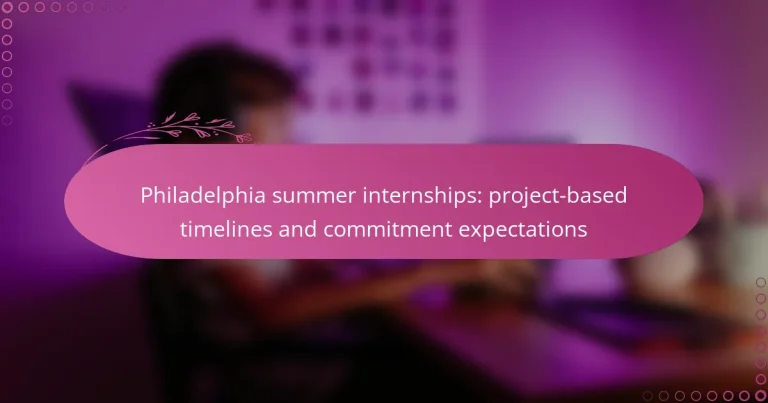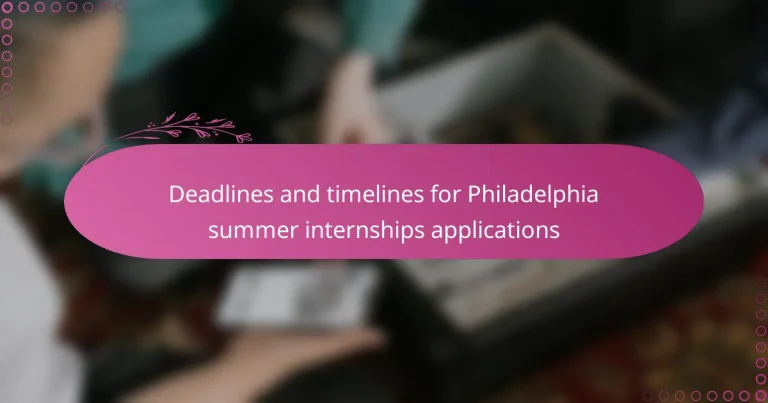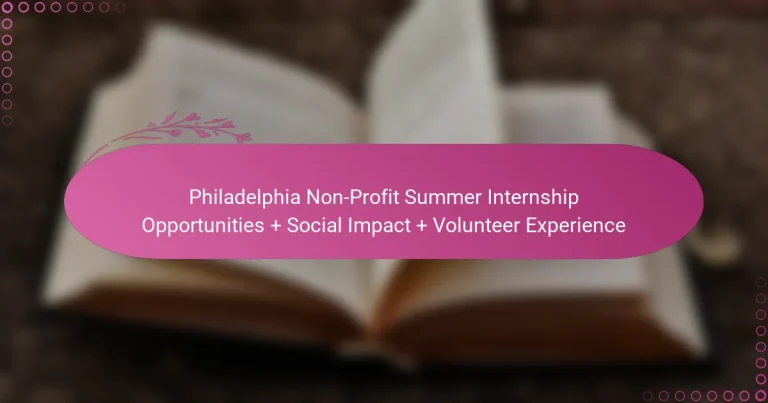

What is the process of preparing for interviews for Philadelphia summer internships?
The process of preparing for interviews for Philadelphia summer internships involves several key steps. First, research the company and its culture. Understanding the organization helps tailor your responses. Next, review the job description carefully. Identify the skills and experiences that align with the role. Practice common interview questions. This enhances your confidence and communication skills. Prepare your own questions for the interviewer. This demonstrates your interest and engagement. Finally, plan your interview attire. Professional dress is essential for making a positive impression.
How can candidates identify suitable summer internships in Philadelphia?
Candidates can identify suitable summer internships in Philadelphia by utilizing online job platforms. Websites like LinkedIn, Indeed, and Glassdoor list numerous internship opportunities. Networking is also crucial; candidates should connect with professionals in their field through events or social media. Local universities often have career centers that provide internship listings and resources. Attending career fairs in Philadelphia can expose candidates to potential employers. Additionally, candidates should consider reaching out directly to companies of interest to inquire about internship openings. Researching industry-specific organizations may reveal unique internship opportunities. These methods increase the chances of finding a suitable internship in the city.
What resources are available for finding internships in Philadelphia?
Various resources are available for finding internships in Philadelphia. Online job boards like Indeed and Glassdoor list internship opportunities. University career centers provide tailored internship listings and guidance. Networking events and career fairs in Philadelphia connect students with local employers. Professional organizations often have internship listings specific to their industries. Websites like Internships.com and WayUp focus exclusively on internships. Social media platforms, particularly LinkedIn, can also be valuable for finding internship opportunities. Local government websites may offer internship programs for students in civic departments.
How do candidates assess the suitability of internship opportunities?
Candidates assess the suitability of internship opportunities by evaluating several key factors. They consider the alignment of the internship with their career goals. Candidates also review the specific skills and experiences the internship offers. Company culture and values are important aspects that candidates analyze. They often seek feedback from current or former interns about their experiences. Job responsibilities and learning opportunities are scrutinized to ensure growth. Candidates may also look at the reputation of the organization within their industry. The location and logistics of the internship are practical considerations as well. Lastly, candidates often assess the potential for networking and job placement after the internship.
What are the key steps in preparing for an interview?
The key steps in preparing for an interview include researching the company, practicing common interview questions, and preparing your own questions. Researching the company involves understanding its mission, values, and recent developments. This knowledge demonstrates your interest and helps tailor your responses. Practicing common interview questions allows you to articulate your experiences clearly. It also builds confidence in your delivery. Preparing your own questions shows engagement and helps you assess if the company is a good fit. Additionally, organizing your resume and necessary documents ensures you present yourself professionally. Finally, selecting appropriate attire based on the company culture is crucial for making a good first impression.
How should candidates research the company before the interview?
Candidates should research the company by reviewing its website, social media, and recent news articles. The company website provides information about its mission, values, and services. Social media platforms like LinkedIn and Twitter showcase company culture and updates. Recent news articles can highlight the company’s achievements and challenges. Candidates should also explore employee reviews on platforms such as Glassdoor for insights into workplace environment. Networking with current or former employees can provide valuable perspectives. Understanding the company’s industry position and competitors is essential for informed discussions during the interview. This thorough research prepares candidates to ask relevant questions and demonstrate their interest in the role.
What common interview questions should candidates anticipate?
Candidates should anticipate common interview questions such as “Tell me about yourself.” This question allows candidates to summarize their background and qualifications. Another frequent question is “What are your strengths and weaknesses?” This helps interviewers assess self-awareness and honesty. Candidates might also hear “Why do you want to work here?” This question gauges motivation and fit for the organization. Additionally, “Describe a challenge you faced and how you overcame it” tests problem-solving skills. Finally, “Where do you see yourself in five years?” evaluates long-term career goals. These questions are prevalent in interview settings, particularly for internships.
Why is it important to practice for interviews?
Practicing for interviews is crucial as it enhances performance and boosts confidence. Preparation allows candidates to articulate their skills clearly. It also helps in anticipating common interview questions. Familiarity with the interview format reduces anxiety. Research indicates that candidates who practice perform better in interviews. A study by the National Association of Colleges and Employers found that interview preparation significantly improves hiring outcomes. Thus, practicing equips candidates with the tools to succeed in competitive internship environments.
What techniques can candidates use to practice effectively?
Candidates can use mock interviews to practice effectively. Mock interviews simulate real interview scenarios. They help candidates gain confidence and improve communication skills. Recording mock interviews allows candidates to review their performance. Feedback from peers or mentors can provide valuable insights. Research shows that practicing in a realistic environment enhances preparedness. Techniques like STAR (Situation, Task, Action, Result) can structure responses. Role-playing different interview styles can also be beneficial.
How does mock interviewing benefit candidates?
Mock interviewing benefits candidates by enhancing their interview skills and boosting their confidence. Candidates receive real-time feedback on their performance. This feedback helps identify strengths and weaknesses. Practicing with mock interviews can reduce anxiety during actual interviews. It allows candidates to refine their responses to common questions. Candidates also learn to articulate their experiences more effectively. Research shows that candidates who engage in mock interviews perform better in real interviews. A study by the National Association of Colleges and Employers found that mock interview participants had a 20% higher success rate in securing job offers.
What are the specific requirements for interviews in Philadelphia?
The specific requirements for interviews in Philadelphia vary by employer. Generally, candidates must prepare a resume and cover letter tailored to the position. Many employers expect candidates to research the company prior to the interview. Dress code is typically business professional, though some companies may allow business casual attire. Interview formats can include one-on-one, panel, or group interviews. Candidates should also be ready to answer common interview questions and provide examples of past experiences. Additionally, some employers may require background checks or drug screenings before hiring. Familiarity with local labor laws can be beneficial for candidates.
How do cultural aspects of Philadelphia influence interview styles?
Cultural aspects of Philadelphia significantly influence interview styles by promoting direct communication and a strong emphasis on personal connections. The city’s diverse population fosters a variety of communication styles, making interviews more conversational. Interviewers often value authenticity and straightforwardness, reflecting the local culture’s appreciation for honesty. Additionally, Philadelphia’s history of labor movements influences a focus on teamwork and collaboration during interviews. Candidates may be expected to demonstrate their ability to work well with others. Furthermore, the city’s educational institutions contribute to a competitive environment, prompting interviewers to seek candidates who can articulate their achievements clearly. This blend of cultural influences shapes a unique interview dynamic in Philadelphia.
What industries in Philadelphia have unique interview practices?
Healthcare and technology industries in Philadelphia have unique interview practices. The healthcare sector often emphasizes scenario-based interviews to evaluate candidates’ problem-solving skills. For example, candidates may be asked to respond to hypothetical patient situations. This approach helps assess both clinical knowledge and interpersonal skills.
In the technology industry, coding challenges are a common interview practice. Candidates may be required to complete technical assessments during the interview process. This method allows employers to gauge technical proficiency and practical application of skills.
Both industries prioritize practical skills and real-world applications in their interview processes. These unique practices reflect the specific demands and expectations of their respective fields.
What should candidates wear to interviews for summer internships?
Candidates should wear business casual attire to interviews for summer internships. This typically includes dress slacks or chinos paired with a collared shirt or blouse. Women may opt for a knee-length dress or a skirt with a blouse. Closed-toe shoes are recommended for both genders. Avoid overly casual items like jeans, t-shirts, and sneakers. Dressing appropriately demonstrates professionalism and respect for the interview process. According to a survey by CareerBuilder, 65% of employers prefer candidates to dress in business casual for interviews.
How can candidates choose appropriate attire for various industries?
Candidates can choose appropriate attire for various industries by researching the specific dress codes of those industries. Different sectors have distinct expectations regarding professional appearance. For instance, corporate environments often require formal business attire, such as suits and ties for men and tailored dresses or blouses for women. In contrast, creative industries like advertising or tech may favor smart casual attire, allowing for more personal expression.
To ensure suitability, candidates should review the company’s website, social media, and any provided interview guidelines. Observing what current employees wear can also provide insight into the expected dress code. Additionally, candidates can consult industry-specific resources or networking contacts for advice on appropriate attire. Dressing appropriately demonstrates professionalism and respect for the company’s culture.
What are the dos and don’ts of interview attire in Philadelphia?
Dos include wearing business professional attire, such as a suit or dress pants with a blazer. Choose neutral colors like navy, gray, or black for a polished look. Ensure clothing is clean, pressed, and fits well to convey professionalism. Dress shoes should be polished and appropriate for the outfit. Accessories should be minimal and tasteful to maintain a professional appearance.
Don’t wear casual clothing such as jeans, t-shirts, or sneakers. Avoid overly flashy or distracting accessories that can take attention away from your qualifications. Steer clear of strong fragrances, as they may be off-putting in close quarters. Do not wear clothing that is too tight or revealing, as it can be perceived as unprofessional. Lastly, avoid any attire that may be considered inappropriate for a formal business setting.
How can candidates follow up after an interview?
Candidates can follow up after an interview by sending a thank-you email. This email should be sent within 24 to 48 hours of the interview. In the email, candidates should express gratitude for the opportunity. They can also reiterate their interest in the position. Mentioning specific points discussed during the interview can strengthen the message. Keeping the email concise and professional is essential. Research shows that timely follow-ups can positively influence hiring decisions. According to a survey by CareerBuilder, 22% of employers are less likely to hire candidates who do not follow up after an interview.
What are effective ways to express gratitude post-interview?
Send a thank-you email within 24 hours of the interview. This shows promptness and appreciation. Personalize the message by mentioning specific topics discussed during the interview. Acknowledging these points demonstrates attentiveness. Express enthusiasm for the position and the company. This reinforces your interest in the role. Keep the email concise and professional. A well-structured message reflects your communication skills. Consider sending a handwritten note for a more personal touch. Research shows that 80% of hiring managers appreciate this gesture.
How should candidates handle follow-up communications?
Candidates should handle follow-up communications professionally and promptly. After an interview, candidates should send a thank-you email within 24 hours. This email should express gratitude for the opportunity and reiterate interest in the position. Candidates should personalize the message by referencing specific topics discussed during the interview. Following up again, if no response is received, can be done one to two weeks later. This follow-up should be polite and concise, asking about the status of the application. Maintaining a professional tone throughout is crucial. Effective follow-up can leave a positive impression on potential employers.
What are some best practices for succeeding in interviews for Philadelphia summer internships?
Research the company thoroughly before the interview. Understand its mission, values, and recent developments. Prepare specific examples of your skills and experiences that relate to the role. Practice common interview questions and your responses. Dress professionally to make a good first impression. Arrive on time to demonstrate punctuality and respect for the interviewer’s time. Follow up with a thank-you email expressing appreciation for the opportunity. According to a survey by the National Association of Colleges and Employers, 77% of employers consider follow-up communication important.
How can candidates showcase their skills and experiences effectively?
Candidates can showcase their skills and experiences effectively by tailoring their resumes and cover letters to the specific internship. They should highlight relevant accomplishments and quantify their achievements. Using action verbs can create a dynamic narrative of their experiences. Candidates should also prepare to discuss their skills in detail during interviews. Practicing responses to common interview questions can enhance their confidence. Providing examples from past experiences can illustrate their capabilities. Additionally, utilizing a portfolio of work can visually demonstrate their skills. Networking with professionals in the field can also provide insights and opportunities.
What strategies can help candidates build confidence during interviews?
Candidates can build confidence during interviews by practicing common interview questions. Rehearsing responses helps candidates articulate their thoughts clearly. Mock interviews with friends or mentors can provide constructive feedback. Researching the company and role allows candidates to tailor their answers effectively. Understanding personal strengths and achievements boosts self-assurance. Positive visualization techniques can help candidates imagine successful outcomes. Dressing appropriately for the interview fosters a professional image and enhances confidence. Finally, maintaining good posture and eye contact during the interview conveys confidence to the interviewer.
The main entity of this article is the process of preparing for interviews for summer internships in Philadelphia. It outlines essential steps for candidates, including researching companies, reviewing job descriptions, practicing interview questions, and selecting appropriate attire. The article also highlights methods for identifying suitable internships, available resources, and techniques for assessing internship opportunities. Additionally, it discusses the importance of follow-up communications and strategies for building confidence during interviews, while noting unique interview practices in specific industries within Philadelphia.






